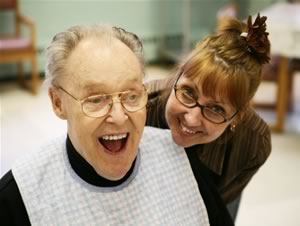 Warning Signs of Caregiver Burnout
Warning Signs of Caregiver Burnout
Caregiver Burnout: Signs, Symptoms, and Prevention
By Dana Schmeckpeper, Touching Hearts at Home
Caring for anybody is a great responsibility. However, caring for a person with Alzheimer’s is particularly overwhelming and can create feelings within you that are difficult to sort through and even more difficult to accept. As a caregiver for a person with Alzheimer’s, your role has changed, and the person with Alzheimer’s is often dependent upon you to remember the details about themselves, their routines, their likes and dislikes, and their life in general, in order to create a stable environment that they are comfortable and secure in. For, as those who do care for a person with Alzheimer’s know, if one aspect of their routine is off, even just once, it can cause the person great agitation and upset the entire day, thereby causing you, the caregiver, much undue stress which will unfortunately carry into other areas of your life.
As a company that matches caregivers to clients with Alzheimer’s and dementia, we make it a point to be cognizant of our caregivers’ lifestyles and are able to control their schedules, so that they don’t over-commit themselves. This experience has made us very aware of the signs of care-giver burnout and methods that can prevent the overwhelming stress associated with caring for the person with Alzheimer’s.
Some signs that you are already experiencing the effects of care-giving are:
- Emotional and/or mental exhaustion
- Feeling stress and pressure to meet demands
- General feelings of unhappiness
- Physical symptoms: Headaches, stomachaches, lethargy
- Sensitivity and Crying more than usual
- Resenting the person receiving your care
- Excessive weight gain
- Inability to relax or calm oneself
- Overreacting to small issues
- Increasing irritability
If you are experiencing even just one of the signs of caregiver burnout, and most importantly, if you can relate to more than one of the symptoms, then it is imperative that you re-assess your situation and immediately enact the following steps to prevent further strain on yourself:
- Take care of yourself:
- Eat healthy and exercise regularly.
- Get a full night of uninterrupted sleep.
- Continue to engage in hobbies and activities you enjoy.
- Maintain your spiritual life.
- Learn to relax: with calm music, a bubble bath, read by candlelight, etc.
- Treat yourself to: an ice cream cone, a manicure, a walk in the park, etc.
- Be realistic and true to yourself:
- Learn to say “no” when you can’t or don’t want to do something.
- Prioritize and stick to your schedules and commitments.
- Educate yourself about Alzheimer’s so that your expectations of the person and your new role in that person’s life are realistic
- Seek assistance:
- Commit a family member or care-giving service to stay with the person you care for, during a regularly scheduled time or times, to relieve you.
- Consider taking the person to an adult day center, where they perform activities specifically designed for the person with Alzheimer’s. Meals and rest times are typically included.`
- Delegate tasks to other family members or your respite caregiver.
Just remember that as a care-giver, you need to take care of yourself first and foremost, so that you can provide the best care possible to the person receiving your care. There are many resources within the community to provide support for you, and we encourage all care-givers to utilize the available resources. Doing so will create the best situation for you and your care receiver.





 Alzheimer's Hope Forum & Message Boards
Alzheimer's Hope Forum & Message Boards